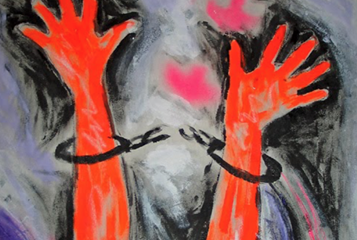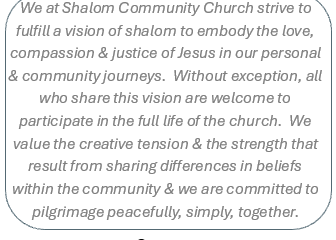Vision and Expectancy
by John Powell
Revelation 7:9; John 4:1-15
While out for my weekly sequestered drive, I saw a billboard displaying a partially rephrased quote by Oscar Wilde that says, ‘All Sinners have a Future” . . . and on the opposite side it reads, “All Saints have A Past”. I read it to mean your afterlife existence. But I asked, what about now?
Being sequestered for many months has given me time for reflection and prioritizing what’s important and what should be laid aside. It also provided an opportunity to do some dreaming . . . even visioning of what the future can, and should, look like. Given our current state of affairs, it’s hard to imagine the future.
Now imagine if you were sequestered like John, the Devine. He resides on the Isle of Patmos, isolated with plenty time to reflect of God’s preferred future. He has loved much and learned much from Jesus.
The future probably wouldn’t look so bright. But he foretells of a triumphant people that is the future. People from all nations have come together in celebration. In a common song, common desire and a sense of unity, they come praising their creator for who God is and who God has made of them.
This is a vision of God’s preferred future for humanity. The church, and its people, have come through trials and tribulations. It has been rocked by internal and external turmoil. Yet, it has gathers triumphantly as one . . . unified, amplified and glorified.
John’s vision was filled with expectation. He understood that God’s intent has always been to claim all of God’s people. He understood that the celebration before God happens on earth first. . . . remember Jesus prayer . . . “your will be done on earth as it is in heaven”? The vision proclaimed a God that made no distinction based on race, nationality, social or economic status.
This church of the future that John visioned has a history . . . one that gathered it’s understanding from the Christ.
In isolation, John probably reflected on the cultural, gender, ethnic and social realities that Jesus and his peers dealt with. I would imagine that he reflected on race as well. Now, we understand that the way we perceive race now is a somewhat different during the life of the early church. But skin tones and racial characteristics were present.
There are many lessons that we can learn from the young (even infant), diverse early church. It faced what seems like insurmountable obstacles. There were walls that had to be torn down . . . walls that were constructed by culture, inequality and exclusiveness and bridges built to cross the currents of ethnic and racial disharmony. But, they found ways to tear down the walls that divided them. No, nothing was perfect; but, they worked at accepting each other as God’s creation and children.
There are many biblical stories of ethnic conflict and reconciliation. Among them are the story of Cornelius and Peter and the Jewish converts in the Samaria. In all instances, right relationships were restored between each other and God.
Paul, probably the most “ethnically pure”, addressing discrimination among the people, admonished them that there were no differences between Jew and Gentile (Romans 10:12).
It reminds me of a saying in church when I was growing up. “I’m not what I wanna be; I’m not what I gonna; but thank God, I’m not what I used to be!”
Jesus was the model that the young church and its leaders followed to tackle hatred and bigotry. He dealt with the biased issues of his day and spoke boldly of the need for a reconciled community. He was multicultural, living in a multicultural world. He engaged the rich, the poor, the marginalized, and the outcast. He was the ultimate “Oak of Righteousness” that pointed to a reconciled community.
Jesus encounter with the Samaritan woman at Jacob’s well demonstrated to his followers and his community, religious . . . and to us . . . that barriers can be taken down between peoples of different nationalities.
Here is a classic encounter between an “insider” and an “outsider”. The encounter not only changes the Samaritan woman to an insider, but it also had an impact on Jesus. Seeing the change, Jesus is more emboldened to fulfil his purpose (John 4:32-38).
Now, you know the story of the encounter . . . we have heard it many times.
There was a feud between the Jewish nation and the Samaritans that can be traced back to Israel’s captivity by the Assyrians. There were some folks left behinds and the captor intermarried with those left behind. These people became known as the Samaritans.
Many years later, some ‘ethnic Jews’ returned to the homeland. They, and their descendants, began to despise the Samaritans . . . they were not one of them. They were a ‘racially’ mixed people and considered unclean and, using a derogatory term . . . ‘half-breeds’. So, they were ostracized and discriminated against (or as we might say ‘racially demonized’).
(Just a side note …. It’s interesting how Jesus seem to point out to the religious leaders Samaritans hospitality. But, that’s another story). What I’m getting at here is that racial animosity is not new. Rather, how it’s dealt with.
Unlike many of the religious people who did not want to have anything to do with the Samaritans and took the long way round Samaria, Jesus went through Samaria enroute to Galilee. He was tired and thirsty.
He could have taken the long way round, but Jesus took a stand . . . not a chance. He had a job to do.
There was a wall . . . a religious, cultural and racial wall between Jesus and the Samaritan woman at the beginning of their encounter. But that wall was torn down during the encounter. His actions spoke volumes.
Jesus accepted the Samaritan woman when he reached out to her for water. There was an exchange . . . water for water. Her water refreshed Jesus. His water restored her!
If I were to ask you to quickly associate wells with any object, you would probably say “water”. Water is a primary source for living. The human body is made up of approximately 60% water. It sustains life. One of the primary functions of water is to remove wastes from the body. As a matter of fact, most people who are in good physical health drink plenty of water.
The conversation between the two did not begin as a comfortable one. She was confrontive, and possibly combative. I can almost hear her now, spewing out the venom . . . “How can you, a Jew, be asking me for water?” I might suggest that she looked beyond her assumed faults and challenged Jesus on his people’s beliefs. She reminded him that we all belong to the same creator; Therefore, the same opportunities, respect and treatment is afforded everyone.
Jesus calmly replied, “If you knew the gift of God and who it is that asks you for a drink, you would have asked him and he would have given you living water. (John 4:10).
Let me pose this question for us to consider. What did Living Water mean for the Samaritan woman? What does it mean for us? We know that biblical scholars, preachers/teachers and Christian believers says that Jesus meant that the Holy Spirit coming and indwelling in us thus bringing salvation and eternal life. Having received living water, the beneficiary provides life to the world. But, is that all? I submit to you that is not all!
Might receiving ‘living water’ say that you are not worthless . . . you have value beyond what you see in yourself. You are not who others say you are? The ‘living water’ given is an affirmation of the presence of the Holy into the life of one who sees themselves outcast and marginalized. I think Jesus was saying to the woman, “Get up. Show yourself to your community. Don’t be ashamed. You are loved and accepted!!!”
He reminded her that she was more than what people saw. She was more than who she saw herself to be. Asking for a simple drink of water led to self-examination and recognition of who she was. By her words and actions she was saying to Jesus, “I see you are not like the rest of them. I accept you with all your cultural trappings! You are accepted in my life and community!”
She wanted everyone to know that someone understood and recognized her value.
Isn’t that what we all desire?
All of this happened at a well . . . a very deep well!!!
So, we are on a spiritual journey. It’s a journey toward discovery of our biased, ethnic, socio-economic and racial blind spots.
Everyone wants to have a meaningful connection with others. It’s a natural instinct because after all we were born to be connected with each other. But we are creatures of habit of our own making. We are repelled by those with whom we have strong disagreements or lack of affinity. Our faith in humanity is shaken when our way of life is threatened.
According to our society, we must give up things we have held dear for so long …. Things that we’ve been taught … the beliefs that we have held to be true are now being questioned. We are challenged to evaluate our perceived place in society, to give up biases and perceptions that we’ve held toward people unlike us. We are called to relinquish our understanding of who we think God is rather than who God has shown us to be. That’s hard! Giving up everything that we have held so dear rocks the core of our being.
I think that the encounter at the well might help us to be open to hearing and experiencing God’s preferred future. When we engage God’s truth, that we are all equal and God doesn’t have favorites, we are made ready to unwind our cultural and ethnic blind spots that keep us enslaved to ourselves.
There are people who engage in ‘color-blind racism’. That is, when talking about race and inequality, the response is “I don’t see color. I see the person”. We assume that exempt us from racial attitudes.
We might rationalize this to be true; however, one can’t help but notice that the person is black, or brown or varying shades in between. When we do this, the person really is invisible to us. The fence that separate us is hard to penetrate. Just as ethnicity existed when Jesus walked the earth, it is probably more evident in our society now.
I want to declare to you today that the words and actions of Jesus is the living water that eliminates the waste of hatred, racism, sexism, cultural snobbery, social and economic inequality among us. It leaves no one behind.
That ‘Living Water’ is . . .
- Unconditional love
- Reciprocal acceptance
- Reconciliation
That “Living Water” springs from the well of Jesus’ words and actions. The well is bottomless and endless. It’s the source that brings liberation and gives life. We are released to proclaim righteousness to all of those who would understand and accept their rightful place in God preferred future. It gives hope to those who seemingly have no hope. It gives reciprocal life to the lifeless and meaning to our existence.
There’s a lot of work to be done. We are very good about keeping a close “homogeneous community”. We are reluctant to talk about race, color, racism, white fragility . . . and the impact of our own economic status on racial inequality. It’s almost a crime to engage in building true and equitable relationships. Each of us, individually and collectively, want to our lives to be the yard stick by which God judges humanity. As a result, a just and reconciled community is compromised.
So, my question to us, “How can break down ethnic and racial walls and give and receive ‘living water’ from people of different races and ethnicities?
Again, this is where water comes in. It’s a key ingredient in building and destroying walls.
Water has some side effects on building walls and destruction of walls. When combined with mortar, it builds a strong bond that holds the bricks or rocks together. It’s hard to penetrate. Yet, when rain comes, overtime drops of rain will penetrate the crevices of the mortar and bit by bit, the wall begins to crumble.
The walls of racism can only be torn down by the rain of living water that comes from entering into an un-biased and equal relationship.
Our renewal journey toward an anti-racist and inclusive society means moving out of our comfort zone. It’s said that a journey begins with a single step. As we leave each other today, I want to suggest that you ask yourself:
- What does God want me to understand about myself?
- What do I do next?
May it be with all of us!



0 Comments